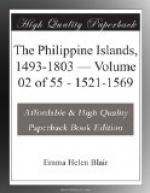Zubu, May 28, 1565. Andres de Mirandaola writes to the king various details of the expedition. “The products we have seen as yet among the natives, are gold, cinnamon, and wax; and their trade consists in these articles. And we are certain that these things can be had in abundance if your vassals, the Spaniards, cultivate the friendship of this land, for the aforesaid natives ... are a people who live without any restraint, neither regarding nor respecting those whom they designate as their seigniors.... It will be necessary for your majesty to conquer this region, for I believe without any doubt, that by no other way can it prove beneficial; nor can the Christian religion be otherwise advanced, because the people are extremely vicious, treacherous, and possessed of many evil customs. Therefore it is necessary for your majesty to order the conquest of this region, which can be done, with our Lord’s aid, without much loss, if your majesty order people, arms, and ammunition to be provided, of all of which we suffer great lack at present.” He tells of the damage inflicted on the Spanish in these regions by the Portuguese. Speaking of the Moro junks found at Butuan, Mirandaola says of the island of Borneo: “This island of Borney is rich, according to what we have heard of it. It is well populated and is very well fortified, having much artillery. Its people are warlike, and there is much trade in all parts of it.” A brief account of the Spanish establishment on Cebu follows, and the consequent communications with the natives, which differ in no respect from other accounts. “Fray Andres de Urdaneta, my uncle, is returning, and is going to serve your majesty in this discovery; and for his companion goes Fray Andres de Aguirre. As captain goes Felipe de Salcedo and Juan de Aguirre, persons whom we know will serve your majesty with all fidelity, faith, and cheerfulness.” He asks (in addition to the “two hundred well armed and equipped men” requested from New Spain) from the king “six hundred well armed men ... of whom four hundred should be arquebusers and two hundred pikemen; large artillery, such as culverins, with ammunition; and ammunition and weapons for those who are here now. The people should be the best that can be found and of good lives.” He asks the king to confirm the reward granted him by Velasco, and to increase his salary to three thousand ducats on account of the high cost of living. (Tomo ii, no. xxxii, pp. 365-372.)
Relation of the expedition by Estevan Rodriguez, chief pilot of the fleet. This relation seems to have been the log kept by this pilot. Many of its entries are simply reckonings. He gives the names, tonnage, captains, and pilots of the different vessels. On the nineteenth of November the banner and standard were consecrated, and the oath taken. The fleet set sail four hours before dawn on November 21, [62] On Sunday, the twenty-sixth, the course was changed in accordance with the sealed instructions given to




